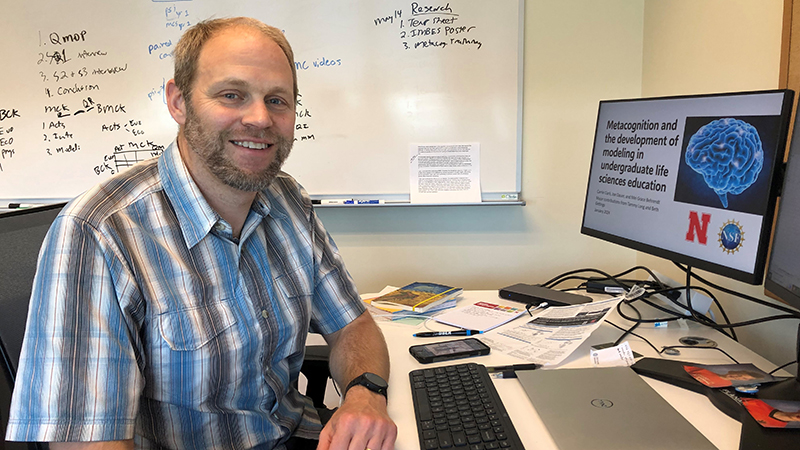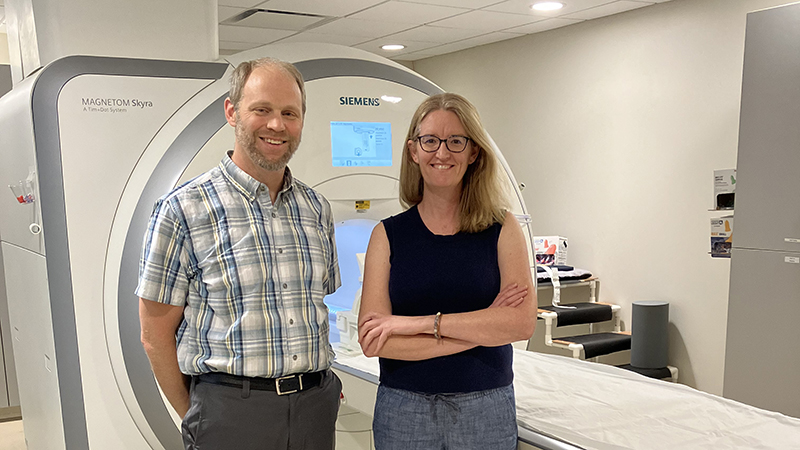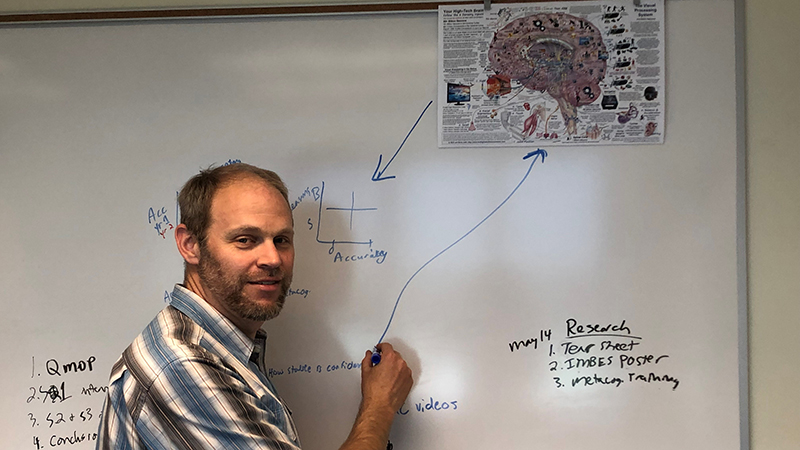Posted: 5/21/2024
Dauer using brain scans to develop better teaching strategies

By Ronica Stromberg
Brain scans of B students may offer educators a clue how to improve learning for all students.
Back in 2020, while looking for ways to improve learning in the sciences, Joe Dauer came up with the idea to scan students’ brains during testing. The life science education researcher in the School of Natural Resources teamed up with Carrie Clark, a neurobiologist, in a grant linking cognitive neuroscience and education.
He said they hoped to detect any variation in brain activity that would explain why some students consistently worked hard yet didn’t earn A’s. If he and Clark could understand that, it should shed light on how teachers could teach better to coax A-level learning from B and C students.
In 2021, the two professors tested 50 university students from an introductory biology class. While individual students lay in an MRI tunnel, the professors projected images of well-known biology models, like of a food web or carbon cycle, above them. The students indicated on a controller whether each of the 36 models had an error or not and how confident they were in their answers. They answered accurately 65 percent of the time.
Using the student test results and the MRI brain scans, Dauer and Clark examined where the students fell on a quadrant of accurate or inaccurate and confident or unconfident. They analyzed the students’ metacognitive sensitivity, the relationship between their accuracy and confidence.
"If you're accurate and you're confident, that's great,” Dauer said of the student test results. " You're aligned. You're calibrated. You know what you know. But if you start to be incorrect or inaccurate but still confident, you're overconfident in what you know, that's not a great thing. You think you know a lot, but you're actually incorrect."
The professors termed students “calibrated” when they were accurate and confident in their answers or when they were inaccurate and unconfident in their answers. The students knew what they knew or didn’t know.
The professors saw a strong relationship between the students being calibrated and their prefrontal cortex of the brain lighting up in the MRI, showing strong activity there. Experts commonly see activity here in scientific reasoning tasks, Dauer said.

A year after the testing with MRIs, the professors requested the students come back for follow-up tests, and 44 students did.
The professors asked the students in a meeting room with no MRI equipment to quickly answer the same questions they had been asked the prior year.
All students performed poorer the second year, and students earning an A in the first year did not necessarily perform better than others a year later.
The professors compared the students’ second-year test results with their brain scans from the first year also. They found that performance in the first year was less accurate at predicting who would do well in the second year than the brain activity shown in the MRI scans.
"The ones who had more activity in that prefrontal cortex are the ones who performed better in year two than the ones who had had less activity in that prefrontal cortex," Dauer said.
For teachers wondering why B and C students might retain as much information as A students yet still not perform as well in the classroom, Dauer offered an explanation.
"What we're finding is increasing evidence that the reason that those B students are retaining information longer is because they are activating parts of their brain differently during the class," he said. "Their brain is working harder during the class, which allows them to retain the information for longer."
Dauer said this finding has implications for all students and science instruction.
"It's showing that if we focus our teaching at the A students, that it doesn't necessarily have long-term payoff for those students," he said. "They are good students. They'll be good students in all their classes. A students tend to be A students in all their classes."
Those A students may not need to invest the effort to perform at a high level, Dauer suggested.
"But the B and C students may be investing in learning differently and this may impact long-term learning," he said.
"That means that if we can teach people, for example, how to be more aware of what they know, you can increase the activity in certain brain regions and that could have long-term impacts."
Instructors should try to help students reflect on what they know and don’t know, he said. Students need to learn to detect their own errors or lapses in knowledge and seek more information to correct their understanding.
Instead of this method of instruction, introductory classes at universities typically try to pour as much knowledge into students’ heads as possible, but those facts may not get organized or constructed in a scientifically accurate or useful way by students, Dauer said.
“Just giving someone more information, more knowledge, is not going to make that brain region light up more," he said.
Teaching needs to include more understanding of how students learn and, also, the understanding that not knowing something and changing one’s ideas are both OK and part of learning, he said.
"Metacognition is not a silver bullet, for sure, like you still need the knowledge,” Dauer said. “But you also need to be reflective on what you know and what you don't know, and that training in thinking about what you know and what you don't know is really important to that learning process."
Dauer said his long-term goal is to improve science teaching and life science education generally. In February, he wrote a proposal for a grant that would provide him with training to be a cognitive educational neuroscientist.
This is a long way, he said, from the plant science studies he did for his master’s and doctoral degrees.
"I know so little about the brain and how the brain works, but that's what's motivating is to learn more about that and to be able to connect that to teaching," he said.
